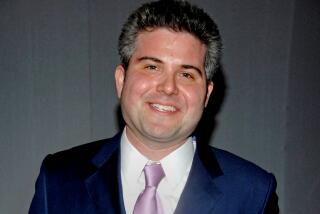THE HIT MEN ARE BACK
- Share via
WHEN you think of modern-day musicals, two names pop right into your head: Craig Zadan and Neil Meron. A producing team for nearly 15 years, their film and TV musicals have won scores of Oscars and Emmys, most notably for “Chicago,” which took home six Academy Awards in 2002. Their credits also include a TV production of “Annie” that marked Rob Marshall’s directorial debut and a TV production of “Gypsy” featuring Bette Midler.
They returned to the big screen this year with “Hairspray,” which earned critical plaudits for managing to be true -- in an exuberant high-camp fashion -- to both the original John Waters comedy and the hit Broadway show.
With John Travolta, Queen Latifah and Michelle Pfeiffer, it offered big-star wattage while capturing the innocence and emerging social conscience of the early 1960s.
--
“Hairspray” and “The Producers” were both beloved cult films that were made into hit stage plays before becoming movies again. Your film worked while “The Producers” didn’t. What was the difference?
Neil Meron: We took a different approach. We honored the Broadway show but we didn’t try to recreate it. Film is a different medium with a different language. If you do it the same way you do it on Broadway, you don’t have a movie.
Craig Zadan: Our mantra has always been: reinvention versus recreation. We analyze each show we do and think about what components work for a film. You quickly learn that most of them don’t. With the stage version of “Chicago,” we discovered, as great as it was, that, oh, my god, there’s no third act! Do you have to be gay to produce a great musical?
Meron: I think the whole gay gene thing with musicals is a cliche. It helps, but look at Arthur Freed -- he was a well-known womanizer.
Zadan: I think it’s more of a Jewish thing. Look at the great musical geniuses -- George Gershwin, Irving Berlin, Richard Rogers, Steven Sondheim, Lorenz Hart. Except for Cole Porter, they were all Jewish.
Meron: You could say we are the chosen people, at least for doing musicals.
--
With a film like “Hairspray,” there’s a very fine line between being sweet and campy -- and being corny. How do you know the difference?
Zadan: Our biggest concern about the movie was tone. The stage show was campy and over the top. We set out to make things comic but not campy. I mean, we still had a man playing a woman.
Meron: Our director, Adam Shankman, told everyone on the film, “I want the picture to look authentically like the ‘60s, but when you’re doing the hairstyles and the costumes, imagine that you took a bicycle pump and gave it two extra pumps.”
--
John Travolta can be absolutely wonderful or totally wrong for a part. What made you think he was right for Edna Turnblad?
Meron: We had to audition with New Line to get the gig. And one of the first questions they asked was, “Who should play Edna?” And we both said, “John Travolta.” There’s no greater movie musical star and we knew if we could lure him back to be in a musical for the first time since “Grease,” it would make the movie an event.
Zadan: We love him. We’d offered him the Billy Flynn part in “Chicago.”
Meron: And he turned it down three times.
Zadan: When we were wooing him for “Hairspray,” we reminded him that after he saw “Chicago,” he told us he thought all the best parts were the women.
Meron: So this time, we offered him the woman’s role. So what did John Waters think of the film?
Meron: He adored it. He sent us an e-mail saying, “You’ve made me a very proud grandfather.”
--
Patrick Goldstein writes The Big Picture, which runs every Tuesday in Calendar.
More to Read
The biggest entertainment stories
Get our big stories about Hollywood, film, television, music, arts, culture and more right in your inbox as soon as they publish.
You may occasionally receive promotional content from the Los Angeles Times.










